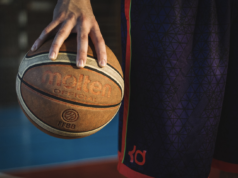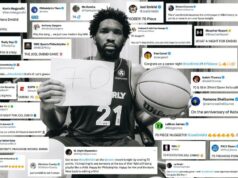 We continue with David Robinson tribute week here at Project Spurs with a look at the “soft” label given to him during his playing career.
We continue with David Robinson tribute week here at Project Spurs with a look at the “soft” label given to him during his playing career.
David Robinson’s list of accomplishments is lengthy, including rebounding, blocked shots and scoring titles to go with the Defensive Player of the Year and MVP award. He is the only player in NBA history to achieve those feats.
Despite his achievements, Robinson struggled to shake the accusations that he and the Spurs were a soft team. Even when he finally won a championship in 1999 people said it did not change anything because it came in the lockout season and Tim Duncan was the go-to player.
To determine if Robinson deserved the label of “soft,” we first have to decide what it means in relation to athletes and sport. To me, a soft player is one that does not play hard and shies away from physical contact. A soft player is one that cannot handle pressure and would rather not be the focal part of a team.
“Soft” has been used in reference to Robinson in a couple ways — describing his off the court persona and how he plays on the court.
Off the court, Robinson was – and still is – a devout Christian, something Sports Illustrated covered in depth with this article from Leigh Montville in 1996. Stories about his faith, which was visible, are well known, and his priorities and life went something like this: God, family, basketball. For many people, this type of lifestyle is soft. He never made headlines for the wrong reason and placed other items ahead of basketball.
On the court, Robinson was criticized for not playing tough in the post, failing to improve his play in the playoffs and not having the mental toughness to carry the Spurs to the NBA Finals. The feelings about Robinson can be summarized by the following quotes from a Sports Illustrated article by Phil Taylor in 1994:
“His talent and grace had never been questioned, but the feeling was growing that after four seasons in the league he was too much of a finesse player, too reliant on jump shots instead of inside power moves. In short, the thinking was that he was too soft to lead the Spurs to an NBA championship.”
“David Robinson has always been nice,” says Detroit’s Isiah Thomas, “and their team has always been nice. But do you want a bunch of guys who are nice all the time, or do you want to win championships? If Dennis [Rodman] can keep David angry, they could make it out of the West.”
The quotes bring up a couple issues. First, the criticism that he played a physically soft style of basketball. Part of Robinson’s problem came from his introduction to basketball late in his teenage years. He entered the NBA with unlimited physical talents but limited basketball skills. Then he played for five coaches in his first six years with each coach asking him to do something different. He was not developed properly from a basketball standpoint and this made it hard for him to develop a complete offensive game early in his career. Then he developed a good jump shot, and with his size he could unleash it whenever he wanted. The NBA was not used to a player of his size and athleticism shooting 15-footers and the reaction was understandably to question why he did not camp out around the basket like his predecessors. Does this make him soft? I don’t think so. We saw that later in Robinson’s career that he had no problems focusing on playing physical basketball against the likes of Shaq. The fact that he won rebounding and shot blocking titles shows that he was a dominant presence around the basket.
The second quote brings up the issue of soft being equivalent to nice. If that is the case then I’m not sure I would want a player who wasn’t soft. We as sports fans are hypercritical if we want a player to avoid trouble and act respectably but then play angry and mean on the court.
The problem stems from how our culture views sports. We describe it in militaristic, violent terms, saying that one team “killed” another, describing a good shooter as a “marksman”, or a long shot as a “bomb”. We too often take a game make it a life or death event and expect the athletes to play that way.
Not too surprisingly, Robinson, a Naval Academy graduate, did not see basketball in these terms. He spent his first two years after graduation between the Navy and the NBA. He would attend NBA events like the All-Star game and then return to his base and see men who were giving their lives to our country and were more concerned about their families. He understood that there were bigger things in this world than basketball.
Some might see this as soft. I see it as intelligent and reasonable.
Now, there is no denying that Robinson deserved some of the criticism that he received. His numbers typically dropped or stayed the same in the playoffs. His career regular season PER was 26.1 but his playoff PER was 23, which is still a great number. Also, Hakeem Olajuwon did outplay him in the 1994-1995 playoffs, which definitely hurt the MVP’s image in 1995.
Not that those numbers are excusable, but Robinson’s supporting cast was weaker than many of his peers. The only All-Star to play beside him before Duncan was Sean Elliott, who made the team twice but was never a dominant player. Karl Malone had John Stockton, and Olajuwon had Clyde Drexler, Otis Thorpe, Ralph Sampson and Charles Barkley. When Robinson and the Spurs made the playoffs, his supporting cast was always weaker than the opponents, making it easier to focus on him.
To answer my initial question, Robinson fits part of my definition of soft. I do not believe he ever held back anything on the court or shied away from physical contact. Some people might interpret his prioritizing basketball lower than other subjects as proof that he did not play hard, but I do not think that is the case. He still played hard but knew that at the end of the day there was a greater meaning to his life than basketball. Now, I do believe early on in his career that he struggled to handle the pressure of the playoffs. However, I also contend that the lack of a second All-Star hurt his ability to compete with the other top teams out West.
As a whole, I do not think Robinson can be called soft. He had his faults (playoff performances) like every player does, but he rarely, if ever, took plays off. He played basketball through more pain than most people realize and gave everything he had to the Spurs organization.
The fact the he is a nice guy and has his priorities straight does not make him soft, it make him all the more admirable.





